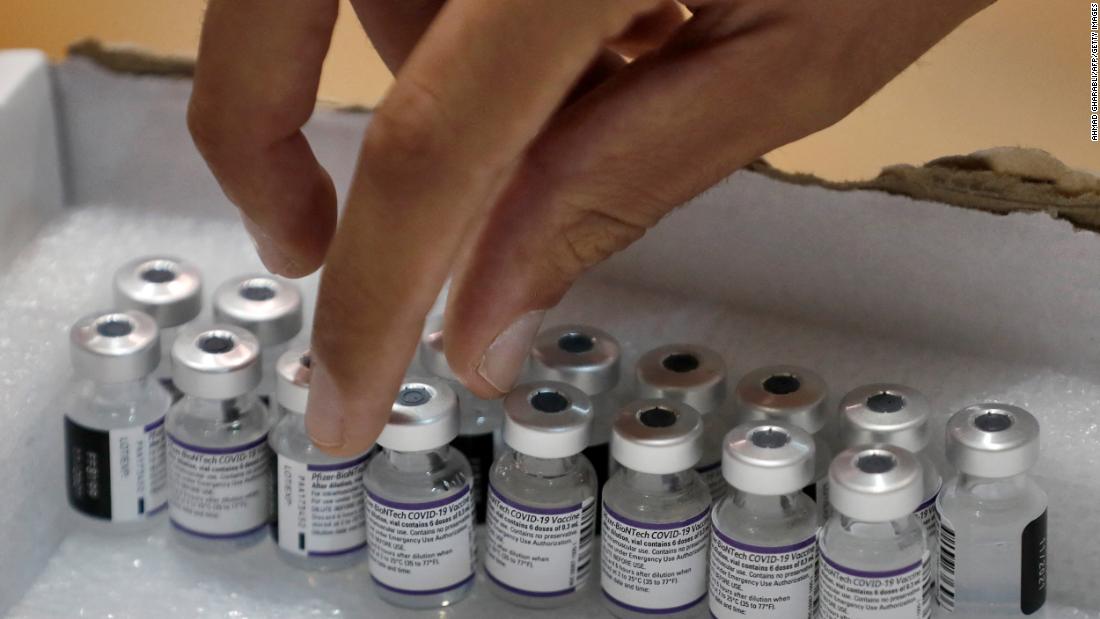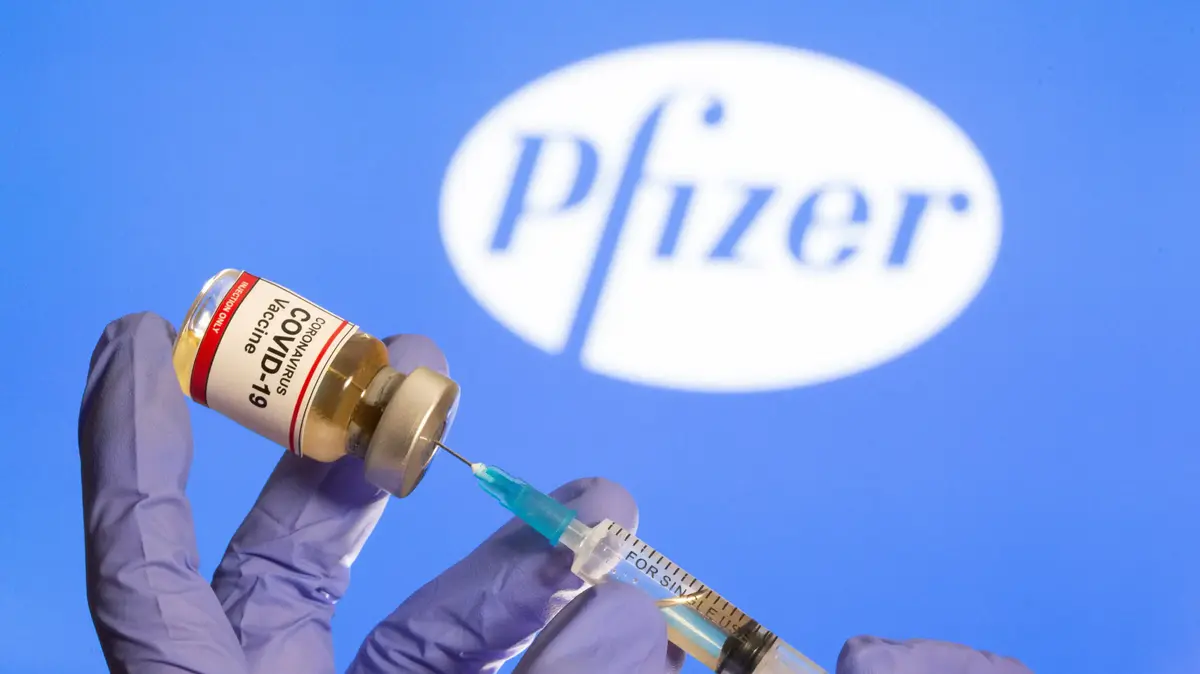Covid-19 will not go away and we will all have to get vaccinated 0:55
(CNN) -
Three reports released Wednesday support the argument that over time people may need a booster dose of Pfizer's covid-19 vaccine, and suggest that such booster vaccines would be safe.
The reports are part of a batch of data that will be discussed Friday by vaccine advisers from the US Food and Drug Administration (FDA).
The FDA is considering a request from Pfizer to approve a third booster dose of its vaccine for most people six months after receiving their first two doses.
But while the FDA made it clear that it would grant US Emergency Use Authorization to the Pfizer and Moderna vaccines last December, it would grant US the Johnson & Johnson vaccine in February and fully approve the Pfizer vaccine on Last month, he was remarkably neutral on the booster dose issue for people in general.
There are "many potentially relevant studies, but the FDA has not independently reviewed or verified the underlying data or its conclusions," it said in a briefing released Wednesday before its Vaccines and Related Biologics Advisory Committee meeting.
Ahead of the FDA vaccine advisers meeting, an agency document says the benefit of covid-19 boosters is "limited" if the first and second doses remain effective.
One of the reports is the formal presentation of data from Israel published earlier this month that showed that booster doses of the vaccine not only increased immunity measured in the blood, but also showed a reduction in infection in the real world.
advertising
Two others, sponsored by Pfizer, support the argument that immunity, measured in the blood, begins to wane over time after people receive both initial doses.
One shows that a booster shot restores that immunity.
The reports, all published in the
New England Journal of Medicine
, are being used by Pfizer and some federal officials to support the argument that most people will need booster doses starting six months after the initial vaccination.
The Pfizer Trial
A study led by Pfizer reports on the ongoing trial of more than 40,000 volunteers. "Over six months of follow-up and despite a gradual decrease in the efficacy of the vaccine, BNT162b2 (Pfizer's vaccine) had a favorable safety profile and was highly effective in preventing COVID-19," wrote the researchers.
"Efficacy peaked at 96.2% during the interval from 7 days to less than 2 months after the second dose and gradually decreased to 83.7% from 4 months after the second dose to the cut-off date of the data: an average decrease of about 6% every 2 months. Continuous monitoring is needed to understand the persistence of the vaccine effect over time, the need for a booster dose and the timing of the dose. "
Two other studies make a stronger case for reinforcements.
Vaccine Effectiveness No Doubt, Expert Says As FDA Weighs Possible Booster Vaccine
One, from Israel, was reported as a preprint in early September.
"In this study involving people who were 60 years of age or older and had received two doses of the BNT162b2 vaccine at least 5 months earlier, we found that the rates of confirmed COVID-19 and severe illness were substantially lower among the they received a booster (third) dose of the BNT162b2 vaccine, "the team wrote.
"At least 12 days after the booster dose, the confirmed infection rate was lower in the booster group than in the no booster group by a factor of 11.3; the rate of severe disease was lower by a factor of 19 , 5 In a secondary analysis, the confirmed infection rate at least 12 days after vaccination was lower than the rate after 4 to 6 days by a factor of 5.4 ".
US federal officials have used this Israeli data to support the case for booster doses.
However, the FDA was more circumspect in its informational document.
"It should be recognized that while observational studies may allow understanding of effectiveness in the real world, there are known and unknown biases that can affect their reliability," the FDA said.
He also expressed a preference for US data.
"Due to these biases, some studies may be more reliable than others. In addition, studies conducted in the US on the post-authorization effectiveness of BNT162b2 may more accurately represent the effectiveness of the vaccine in the US population. USA, "he said.
American researchers working with Pfizer said in a short letter to the
New England Journal of Medicine
that they also found evidence that a booster shot would help restore weakened immunity.
1 in 500 US residents has died of covid-19
"The safety and immunogenicity of a BNT162b2 booster dose given 7 to 9 months after the primary two-dose series suggests that a third dose might prolong protection and further increase the breadth of protection," they wrote.
"Efficacy decreased to 84% between 4 and about 6 months after dose 2," wrote the team, led by Dr. Ann Falsey of the University of Rochester.
They gave a third dose about eight months after people received their first two doses.
Neutralizing antibodies, the first line of immune defense against infection, rose dramatically, to levels five to seven times higher than the levels of immunity seen after two doses.
The high levels of protection also covered two worrisome variants: the beta variant or B.1.351 and delta, or B.1.617.2, which accounts for virtually all infections in the US today.
The study could not show whether this immunity measured in the blood translates into real protection against infections and serious diseases.
Moderna's study
Separately, vaccine maker Moderna released some data on declining immunity and booster doses of its covid-19 vaccine on Wednesday.
Florida vaccine advocate loses 6 family members to covid-19 in 3 weeks
A team led by Moderna reported interim data covering 80 volunteers in an ongoing trial who received booster doses of the currently licensed Moderna vaccine, or vaccines reformulated to match the beta variant, gamma variant, or P.1 , or the delta variant.
All volunteers had received two full doses of Moderna's vaccine.
Six months later, their blood was tested and then they received boosters.
"Immediately before the booster dose, the neutralizing antibodies against the wild-type D614G virus had decreased," the team wrote in their report, published in
Nature Medicine.
D614G was the circulating strain before B.1.1.7 or alpha spread throughout most of the world.
"Both the mRNA-1273 boost and variant-modified boosters were safe and well tolerated," the team added.
All vaccines increased levels of so-called neutralizing antibodies, immune system proteins that are the first line of defense against infection.
Levels returned to the equivalent of protection just after full vaccination, two weeks after the second injection, they said.
Moderna also said she had data showing that immunity to her vaccine also waned, months after people completed the two-dose series.
It compared nearly 15,000 people who received the vaccine early as part of its covid-19 COVE vaccine clinical trial more than a year ago to 11,000 people vaccinated between December and March.
"In the analysis, there were 88 post-vaccination cases of COVID-19 in the most recently vaccinated group compared to 162 cases in the group vaccinated last year," Moderna said in a statement.
Chile and four other countries that are reopening and are now living with covid-19
That works out to 49 cases per 1,000 person-years among people vaccinated between December and March, compared to 77.1 cases per 1,000 person-years for people vaccinated between July and October 2020.
"The increased risk of breakthrough infections in the COVE study, participants who were vaccinated last year compared to the most recent ones illustrates the impact of waning immunity and supports the need for a booster to maintain high levels of protection. We hope that these findings are useful as health authorities and regulators continue to evaluate strategies to end this pandemic, "Moderna CEO Stéphane Bancel said in the statement.
Moderna is also requesting the FDA to authorize booster doses of its vaccine.
Covid-19 vaccine against covid-19










/cloudfront-eu-central-1.images.arcpublishing.com/prisa/2C5HI6YHNFHDLJSBNWHOIAS2AE.jpeg)




